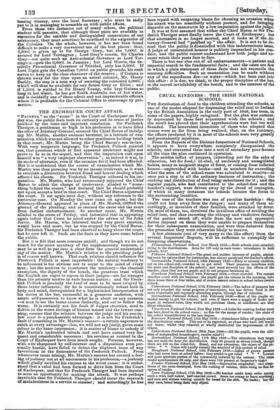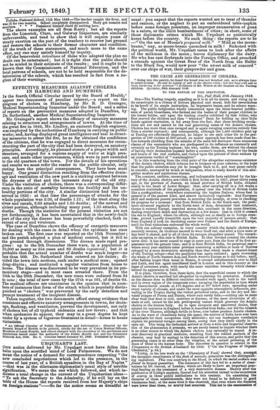CRUEL KINDNESS: THE IRISH NATIONAL SCHOOLS.
THE distribution of food to the children attending the schools, as one of the modes adopted for dispensing the relief sent to Ireland by the British Association in the early part of 1848, has been, in some of the papers, highly eulogized. But the plan was earnest- ly deprecated by those best acquainted with the schools ; and the result has proved that their apprehensions were but too well founded. The benevolent intentions of those who adopted this course were so far from being realized, that, on the contrary, the effects produced by it in most of the schools were very greatly and permanently injurious.
From the Reports of the District-Inspectors of National Schools, it appears to have everywhere completely disorganized the schools, and converted them into a sort of secondary poor-houses all the time the plan continued in operation. The sudden influx of paupers, (attending not for the sake of education, but for food,) ill-clad, of uncleanly and unregulated habits, many in incipient stages of fever, or coming from infected homes—unprovided with books—and in numbers far exceeding what the area of the school-room was calculated to receive—at once put a stop to all the ordinary business of instruction; the cooking and distribution of food being substituted for it ; and the regular pupils, who had contributed to the school-fees and the teacher's support, were driven away by the dread of contagion, of which in many instances the schools became the focus to the surrounding localities.
The case of the teachers was one of peculiar hardship : they could not keep away from the danger ; and many of them ac- cordingly, or members of their families were attacked by fever. On most of them too, devolved the invidious office of revising the
incurring
relief-lists, and thusr the obloquy and vindictive feeling of the parties struck off; while from the new and oppressive imposed mposed on them they were unable to prepare themselves for their subsequent examination, and were thus debarred from the promotion they were otherwise likely to receive.
A few abstracts (out of very many to the like effect) from the several Inspectors Reports, will be sufficient to exemplify the foregoing observations.
Drininacuna National School, 31st March 1848.—Both schools over-crowded; owing to the distributions. Area for 120 only in each room: attendance in both schools, 354!
Fillmore National School.—The great and sudden increase of pupils, attend- ing more for rations than for instruction, has almost paralyzed the teacher's efforts.
Gortnaskeha National School, 19th January 1848.—Sixty or seventy children, not on the school-roll, crowded in to get relief. Their presence interferes with the quiet and discipline of the school; and must severely tax the efforts of the teacher, since they are not pupils and do not propose becoming so.
Grunkane National School, 24th February 1848.—Over-crowded. The rations interfere much with the business: the pupils get the rations in the morning, take them home three or four miles, and of coarse cannot return to school before twelve o'clock.
Cahirciceen National School, 17th February 1848.—The influx of paupers has not only retarded the usual progress of instruction, but has driven from it the more respectable and regularly-attending pupils, through fear of infection. Gurtuabinni National School, 18th February 1848.—Most of the pupils at- tended merely to get the rations; and even if there were a supply of hooks and paper at reduced rates, they would not purchase them, so indifferent are they about education.
Vicarstown National School, 31st May 1848.—A boiler for cooking Indian meal has been fixed in the school- room ; no flue for the escape of smoke; the state of the school unsatisfactory in the last degree. Kennuire National School, 12th May 1848.—Attendance fallen off greatly since the distributions ceased. This not to be regretted, as those who have left would not learn; whilst they retarded or wholly obstructed the improvement of the othersh Cairciveen National School, 28th Jane 1848.—All the pupils, even the chil- dren of independent housekeepers, receive relief!! Gortuabinni National School, 11th May 1848.—The attendance very large, but not until the hour for distribution. Only 28 present at eleven o'clock, though there are 100 on the relief-list. Bread, and not education, the object of the pa- rents. • • Years will hardly remedy the mischief of this system of relief. Bunglaush National School 14th February 1848.—Influx of grown persOnS who had never been at school before: they attend to get relief. • • •Lowest and most ignorant portion of the community induced by the rations. The roma would accommodate 38 only, and there were 110 present at Inspector's visit! Fruiter National School, 31st May 1848.—Instruction suspended; and clean- liness of the room destroyed, from the cooking of rations, there being no flue for egress of smoke.
Lara National School, 17th May 1848.—No teacher could keep order among such a wild, half-naked, half-starved crowd. Some too young to learn anythin_ and men and women waiting outside for bread for the sick. -No books; nor did they care, bread being their only object. TiNohu National School, 11th May 1848.—The teacher caught the fever, and was ill for two months. School completely disorganized. Many got measles and smallpox. • * * Pestalozzi himself could do nothing here.
The above examples are all from Kerry ; but all the reports from the Limerick, Clare, and Galway Inspectors, are similarly unfavourable, and tend to show that it will require years of steady exertion on the part of the teachers to recover lost ground and restore the schools to their former character and condition. Of the truth of these statements, and much more to the same effect, any one may satisfy himself by inquiry.
Of the benevolent intentions of those who adopted the plan no doubt can be entertained ; but it is right that the public should not be misled in their estimate of the results ; and it ought to be known that the Commissioners of National Education, and the local patrons of schools, are not to be held responsible for the de- terioration of the schools, which has resulted in fact from a ne- glect of their warnings.



























 Previous page
Previous page